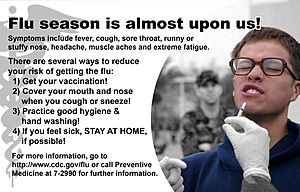Health facts for kids
Health means feeling good in every way – with your body, your mind, and how you get along with others. The World Health Organization (WHO) says it's not just about not being sick. It's about feeling completely well.
- Physical health is about your body.
- Mental health is about how you think and feel.
- Social health is about how you live with family, friends, and others in your community.

Contents
What is Health?
Physical Well-being
Physical health means your body is working well. It's about being strong and able to do everyday things without getting too tired. This includes things like walking, running, and playing sports.
Your physical health depends on a few things:
- Your genes: Some health traits are passed down from your family.
- Your environment: Where you live matters. Clean air and water, and good medical care, help you stay healthy.
- Your choices: What you do every day is very important!
To keep your body healthy, you should:
- Exercise regularly: This makes your muscles and heart strong.
- Eat a balanced diet: Eating healthy foods gives your body the energy and nutrients it needs.
- Get enough rest: Your body needs time to recover and grow.
A good way to check your physical health is by looking at your Body Mass Index (BMI). This is a number that compares your height and weight. It helps show if your weight is healthy for your height. Being too heavy or too thin can affect your health.
Mental Well-being
Mental health is about your emotions and how you think. It means you can handle your feelings, solve problems, and deal with everyday challenges. When you have good mental health, you feel capable and can manage stress.
Signs of good mental health include:
- Feeling able to handle things.
- Being able to deal with normal stress.
- Having good relationships with friends and family.
- Being able to live an independent life.
- Being able to "bounce back" after tough times.
It's normal to feel sad or stressed sometimes. But if these feelings last a long time or stop you from doing things, it's important to talk to a trusted adult or a doctor.
Public Health
Public health is about keeping whole communities healthy, not just one person. It focuses on preventing diseases and promoting good health for everyone. Public health efforts help people live longer and healthier lives.
Public health workers try to stop diseases from spreading. They do this by:
- Watching for diseases: They keep track of illnesses to see where and how they are spreading.
- Teaching people: They educate communities about healthy habits.
- Running vaccination programs: These programs help protect many people from serious diseases.
- Making sure water is clean: Clean drinking water stops many illnesses.
Simple actions can make a big difference in public health. For example, Hand washing for about 30 seconds is very important, especially when there are many germs around. Sometimes, avoiding crowded places or wearing a mask can also help stop the spread of sickness.
Related pages
Images for kids
-
Donald Henderson as part of the CDC's smallpox eradication team in 1966.
-
Nurses in Kokopo, East New Britain, Papua New Guinea
See also
 In Spanish: Salud para niños
In Spanish: Salud para niños
 | Bayard Rustin |
 | Jeannette Carter |
 | Jeremiah A. Brown |






